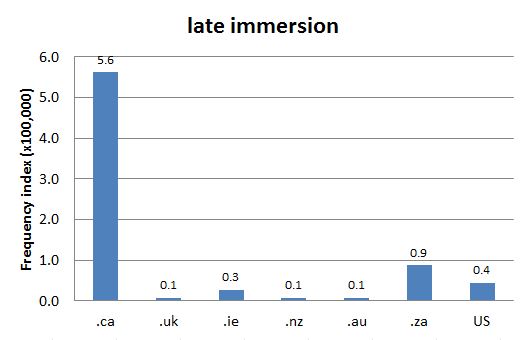DCHP-2
late immersion DCHP-2 (October 2016)
n. — Education, French relations
a program to teach French to English speakers beginning in grade 6 or 7 in which most courses are taught in French.
Type: 1. Origin — OED-3 defines immersion as a 'method or system of teaching (or learning) a foreign language in an environment where all communication is conducted in the language'. In Canada, the term almost always refers specifically to the French language (see French immersion). Late immersion, therefore, is a program starting in Grade 6 or later in which a certain percentage of courses are taught exclusively in French (COD-2, s.v. "late immersion"). The percentage of courses that must be taught in French per school year vary by province and school district but can generally be anywhere from 50 to 80% (see VSB reference). This program contrasts with early immersion, which starts in the primary school years of kindergarten or grade 1. Internet search results indicate that late immersion occurs most frequently in Canada (see Chart 1).
See also COD-2, s.v. "late immersion", which is marked "Cdn".See also: core French French immersion early immersion
References:
- COD-2
- OED-3 s.v. "immersion" Accessed 21 Jul. 2014
- VSB "Late French Immersion" Accessed 21 Jul. 2014
Images:
Chart 1: Internet Domain Search, 22 Jul. 2014
